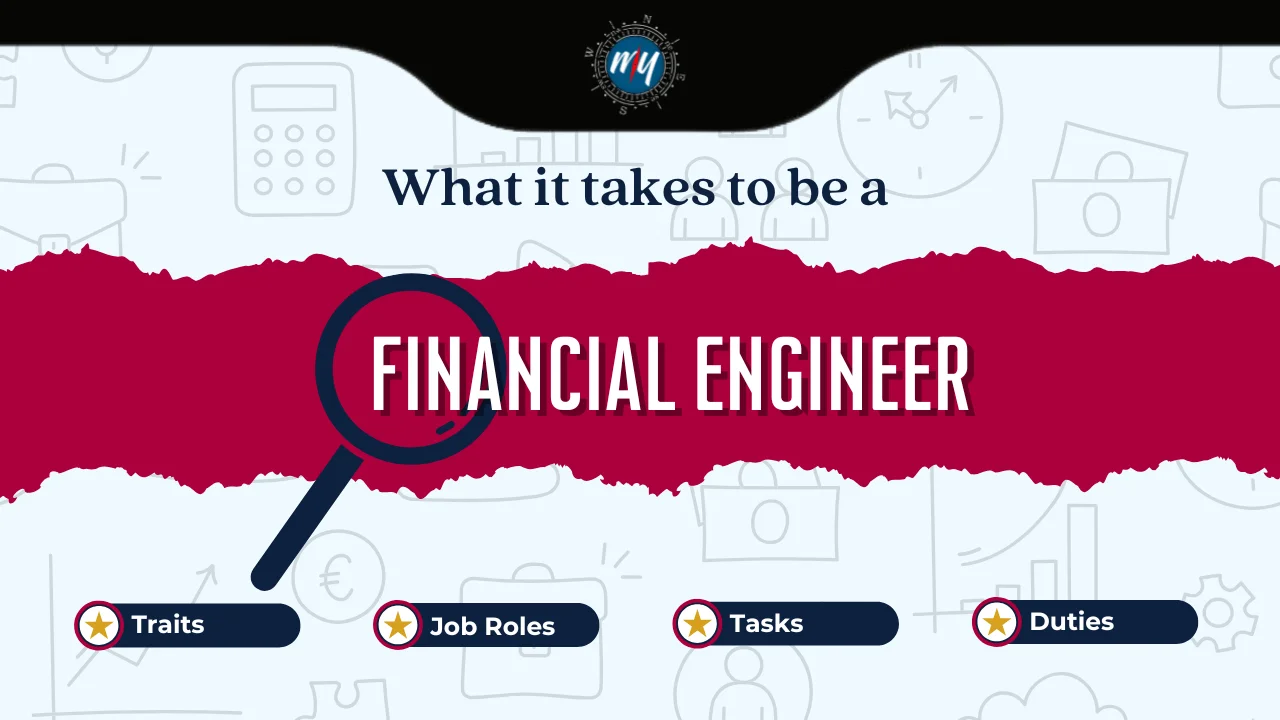How to Become a Financial Engineer?
Explore the path to a successful career as a financial engineer, from required skills and education to job roles and career opportunities

In this Career Outline

Introduction to Financial Engineer
"The best content doesn't come from a single source. It comes from multiple voices sharing their unique perspectives." — Ann Handley
Financial engineers work for financial institutions like banks and investment firms, using skills in mathematical modeling, economic principles, statistics, and programming. They use quantitative methods to examine economic data and assess financial products. Proficiency in relevant technologies, including Microsoft Office and programming languages like Python, SQL, UNIX, and JavaScript, is essential. A bachelor's degree is typically required, with preference for candidates with relevant experience or qualifications from recognized finance programs. Financial engineers must also manage stress effectively and stay updated on cloud and network technologies.
Steps to Become a Financial Engineer:
Step-1
Learn about financial engineering's core responsibilities, including designing financial models, risk management, and algorithm development.
Step-2
Obtain a strong foundation in mathematics, finance, and computer science through undergraduate studies.
Step-3
Consider enrolling in specialized finance engineering programs to gain in-depth knowledge and skills.
Step-4
Intern or work in financial institutions to acquire hands-on experience and industry insights.
Step-5
Master programming languages such as Python, R, and MATLAB, and understand financial modeling and quantitative analysis.
Step-6
Pursue a master’s or doctoral degree in financial engineering or a related field for advanced career opportunities.
Step-7
Continuously learn about the latest trends and technologies in financial engineering to stay competitive.
Eligibility Criteria
| Eligibility Criteria | Description |
|---|---|
| Eligibility | Must possess at least 50% aggregate from a recognized institution (PUC/CBSE/ICSE/ISC, etc.) |
| Educational Background | High school diploma or equivalent. |
| Undergraduate Degree | A degree in B.Sc, B.Tech, or a diploma in Finance, Economics, Mathematics, Statistics, Engineering, Computer Science, or a related field is required. |
| Postgraduate Degree | An M.Tech in Computer Science Engineering, or a master’s degree in Financial Engineering, Quantitative Finance, Applied Mathematics, or a related discipline is preferred for advanced roles and better learning opportunities. |
| Entrance Exams | Should achieve a valid score in entrance exams such as JEE-Main, KIITEE, SRMJEE, CEE, HITSEE, CET, etc. |
- Minimum 50% aggregate in 12th grade from any recognized board (PUC/CBSE/ICSE/ISC). Cut-off varies by college.
- Obtain a valid score in entrance exams after 12th like JEE-Main, KIITEE, SRMJEE, etc. Colleges may have their own exams or accept other competitive scores. Certain programs might require the GRE or GMAT.
- Earn a B.Sc/B.Tech or Diploma in Finance, Economics, Mathematics, Statistics, Engineering, Computer Science, or a related field.
- An M.Tech in Computer Science or a master's in Financial Engineering, Quantitative Finance, or Applied Mathematics is advantageous.

Not eligible to pursue this career?
Find out different career options based on your current academic accomplishments. Enquire with our career experts and build a roadmap to your career success!
Tasks to perform as a Financial Engineer:
Knowledge & Skills Required
Financial Engineers must possess a wide array of skills to succeed in their careers. Here are the key knowledge areas and skills needed to excel in this field:
| Knowledge Required | |
|---|---|
| Proficiency in calculus, linear algebra, probability, and statistical methods for data modeling and analysis. | Understanding of financial markets, instruments, portfolio management, and economic theories. |
| Knowledge of programming languages such as Python, R, C++, or Java for implementing financial algorithms. | Skills in quantitative analysis, stochastic processes, and optimization methods. |
| Familiarity with risk management, derivatives pricing, and asset valuation. | Proficiency in analyzing and interpreting large datasets, along with using data visualization tools. |
| Skills Required | |
|---|---|
| Analytical Skills | Quantitative Analysis |
| Programming Skills | Project Management |
| Communication skills | Problem-Solving skills |
Understanding What are soft skills? and why is it important,as they complement technical abilities and enhance overall performance in the field of Financial Engineer.

The Knowlegde and Skills don't intrigue you?
Your career may not align with your interests. Identify them and match with careers requiring those skills for faster growth and success!
Job roles offered for a Financial Engineer:
With the qualifications to become a Financial Engineer, you'll have numerous career opportunities and the chance to explore various fields and projects.
Analyzes financial data to forecast investment success, helping clients and companies make informed decisions about equities, bonds, and other investments.
Evaluates a company's financial condition, market trends, and investment proposals to provide recommendations and support decision-making.
Analyzes data to assess investment opportunities and provide advice on buying, holding, or selling assets. Focuses on patterns affecting specific sectors or markets.
Assesses financial records and potential risks associated with business decisions, commonly working in banks, insurance firms, or any organization handling large sums of money.
Oversees a company's investment strategies, manages investment portfolios, and leads a team to optimize returns and make strategic recommendations.

Not sure where you fit in?
With countless career options, choosing the right path can be tough. Analysis and guidance sessions help clarify what to study, pursue, and achieve.
Career Opportunities for a Financial Engineer:
Financial Engineers can opt for various fields of work in the companies listed below:
| IBM | Morningstar | Shell |
| Baker Hughes | Bank of America | NatWest Group |
| Oracle | JP Morgan Chase & Co. | HSBC |
| Cisco |
Colleges offering courses for Financial Engineer:
Here is the list of colleges offering the Best courses after 12th:
| St Xaviers College, Ranchi | KJ Somaiya College of Science and Commerce, Mumbai |
| PSGR Krishnammal College for Women, Coimbatore | Sri Krishna Arts and Science College, Coimbatore |
| JBIMS Mumbai - Jamnalal Bajaj Institute of Management Studies | School of Distance Education, Andhra University, Visakhapatnam |
| BJB Autonomous College, Bhubaneswar | Karmaveer Bhaurao Patil College, Vashi |
| Samrat Prithviraj Chauhan Government College, Ajmer | Serampore College, Serampore |
End Note
Becoming a financial engineer opens doors to a dynamic and rewarding career at the intersection of finance, mathematics, and technology. If you’re ready to embark on this exciting journey, connect with our experts at SetMyCareer. We're here to guide you with Career counselling after graduation towards achieving your career goals and unlocking your full potential in the world of financial engineering. Reach out to us today!
In this Career Outline
You don't fit in as a Financial Engineer?
Find out your best suitable career by booking an appointment with our experts
Book nowGet In Touch
No. 14/595, 1st Floor, Nanjappa Reddy Layout, Koramangala 8th Block, Bangalore 560095






